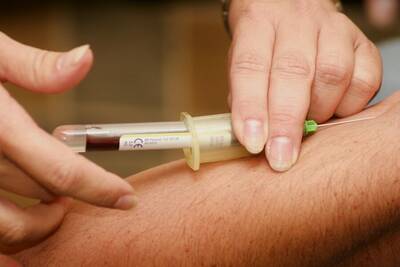No, it’s neither hereditary nor infectious. However, some families have more cases of autoimmune disorders, which also means that ITP could be more prevalent in those families.
ITP generally occurs in ‘isolated’ persons. There is very little knowledge available on how autoimmune diseases such as ITP arise. Like most autoimmune disorders, they are roughly twice as likely to occur in women as they are in men. Furthermore, roughly 30% of ITP patients already have another autoimmune disease (such as rheumatoid arthritis, thyroid gland disorders, SLE, etc.).
Prednisone inhibits the immune system (=defence system). In ITP patients, the immune system has turned against the patient’s own blood platelets. Prednisone reduces that. There is, unfortunately, no knowledge on why it works for some and not for others. Prednisone works in roughly 60%-70% of patients.
|
ITP in children can be the same as ITP in adults. That is when we are basically dealing with the chronic form of ITP. By that, we mean an autoimmune disorder, i.e. a disorder of the defence system. The defences should attack everything that is foreign to the body, such as bacteria and viruses. In case of chronic ITP, the defence system turns on the person’s own platelets. By Children’s ITP, we may also mean acute ITP, which resolves within a period of several months to a year. It is generally preceded by an infection or vaccination. |
|

ITP in children can be the same as ITP in adults. That is when we are basically dealing with the chronic form of ITP. By that, we mean an autoimmune disorder, i.e. a disorder of the defence system. The defences should attack everything that is foreign to the body, such as bacteria and viruses. In case of chronic ITP, the defence system turns on the person’s own platelets.
By Children’s ITP, we may also mean acute ITP, which resolves within a period of several months to a year. It is generally preceded by an infection or vaccination.
Bone marrow puncture (also called bone marrow aspiration) and bone marrow biopsy are different ways to collect bone marrow. They are usually taken from the pelvis. In general, both specimen are collected during one procedure. Aspiration removes a sample of the liquid portion of bone marrow inside the bones. The aspirate is sent to the haematology lab or the clinical chemistry lab. A bone marrow biopsy removes a small, solid piece of bone marrow using a tool that looks like a small apple corer. This specimen is sent to the pathology lab.
When bone marrow is aspirated, the cells are mixed in the thick soup-like liquid. The advantage is that, unlike a bone biopsy, no formalin fixation and decalcification is required. This results in higher quality microscopy. In addition, the aspirate can also be analysed for chromosomal abnormalities that occur in leukemia. ln the piece of bone that has been extracted, however, the cells stay in the same order and structure as they are inside your body. This bone fragment is fixed in formalin, decalcified and cut into small thin slices, which are subsequently analysed under a microscope. An analysis of a bone marrow biopsy may provide extra information, in particular when marrow aspiration fails, for example due to scarring (fibrosis) that is caused by certain bone marrow diseases.
A low platelet count can occur when the normal bone marrow, responsible for platelet production, is replaced by abnormal cells. This happens with leukaemia (blood cell cancer). In order to rule this out, many doctors decide to do a bone marrow biopsy/puncture. However, if only the platelet count is low and the other cell counts, the medical history, and physical exam are normal, the guidelines of the American Society of Hematology (Neunert et al, 2019) state that a bone marrow biopsy and/or puncture is not required.
 |
If the situation is stable, you won’t need to have your platelets counted very often. When you have just been started on a treatment, platelet counts will be performed more often to see if the treatment is working. Also, when you are going to have an intervention, such as by an oral surgeon, it is advisable to count the thrombocytes shortly before the intervention, so as to adapt the treatment accordingly, or to see if the treatment can go ahead. |

If the situation is stable, you won’t need to have your platelets counted very often. When you have just been started on a treatment, platelet counts will be performed more often to see if the treatment is working.
Also, when you are going to have an intervention, such as by an oral surgeon, it is advisable to count the thrombocytes shortly before the intervention, so as to adapt the treatment accordingly, or to see if the treatment can go ahead.
There are various kinds of pain relief options. If the platelet count is low, you should not take NSAIDs. NSAIDs are painkillers that also have an infection-inhibiting effect. These include ibuprofen, naproxen, and diclofenac.
NSAIDs do not lower the number of platelets. However, they reduce the effect of blood platelets. As a result, the risk of hemorrhage increases. Aspirin also falls into the NSAID category. The only over-the-counter painkiller that you can use with a low platelet count is paracetamol.
After you stop taking an NSAID, however, normal platelet function will return. Depending on the drug, this may take some time.
People who have ITP should take measures to prevent wounds. You should avoid contact sports and be extra careful when handling sharp objects. Taking good care of your teeth can prevent gum bleeding and keeping your bowel movements smooth will prevent constipation-related bleeding. Women experiencing heavy menstrual bleeding due to ITP could opt to go on the pill.
Regular blood platelet counts will give you an indication of how the disease is developing in your case. Given that the disease has both quiet periods and acts up at other times, it is important that you have check-ups.
In their everyday life, people who have ITP sometimes may experience discomfort and pain due to bleeding. ITP can also lead to extreme fatigue. This fatigue can be so severe that you have to take leave from work or suspend your studies and/or reduce your social life.
When you are diagnosed with ITP, it is not known yet whether it is temporary or will develop into chronic ITP. The latter is the case in roughly half of all adults with ITP. Uncertainty about the course of the disease can be a burden that you carry with you.
Talk to your doctor about your symptoms and how they affect your everyday life.
There is no scientific evidence for that. If it does help, it would purely be a coincidence and you should ask yourself if your thrombocyte count would not have gone up as well without the diet or food supplements. What is important is that you use your common sense. If you feel good with a certain therapy or diet, and it doesn’t harm you, then by all means go for it.
Tel. 085-1303570 | E‑mail info@itp‑pv.nl | Bank 1 NL69RABO0345603702 | BIC RABONL2U |Bank 2 NL91ABNA0401810461 | BIC ABNANL2A | KvK 17156005 | ANBI 8135.93.372


